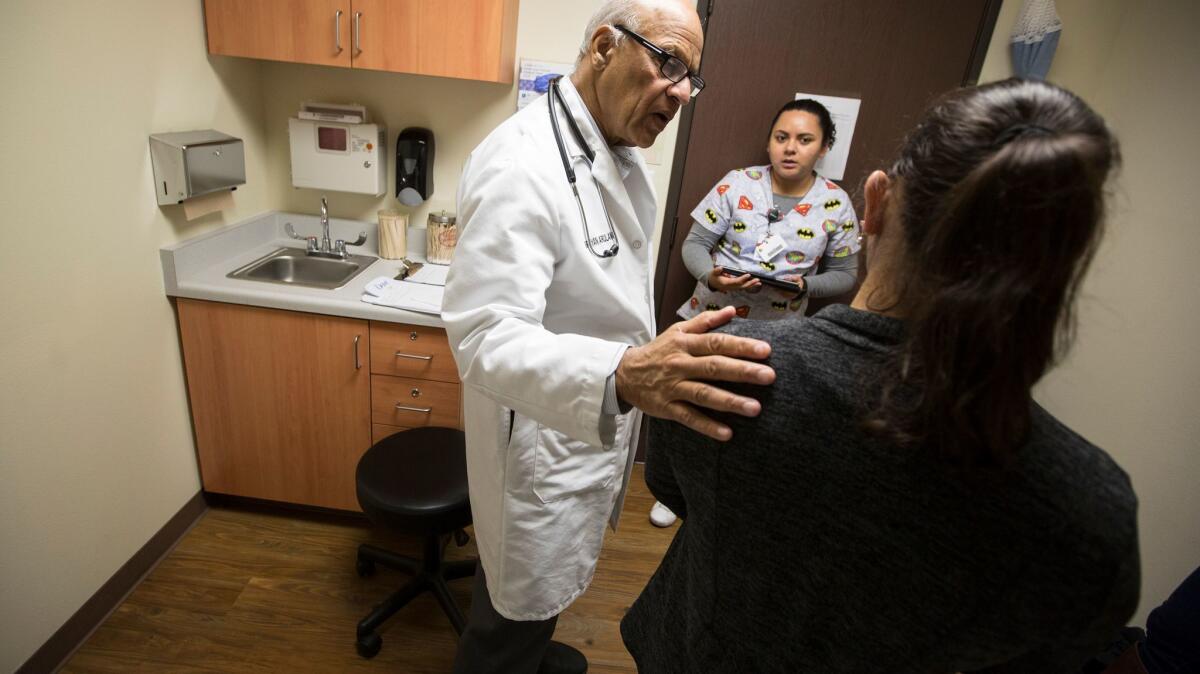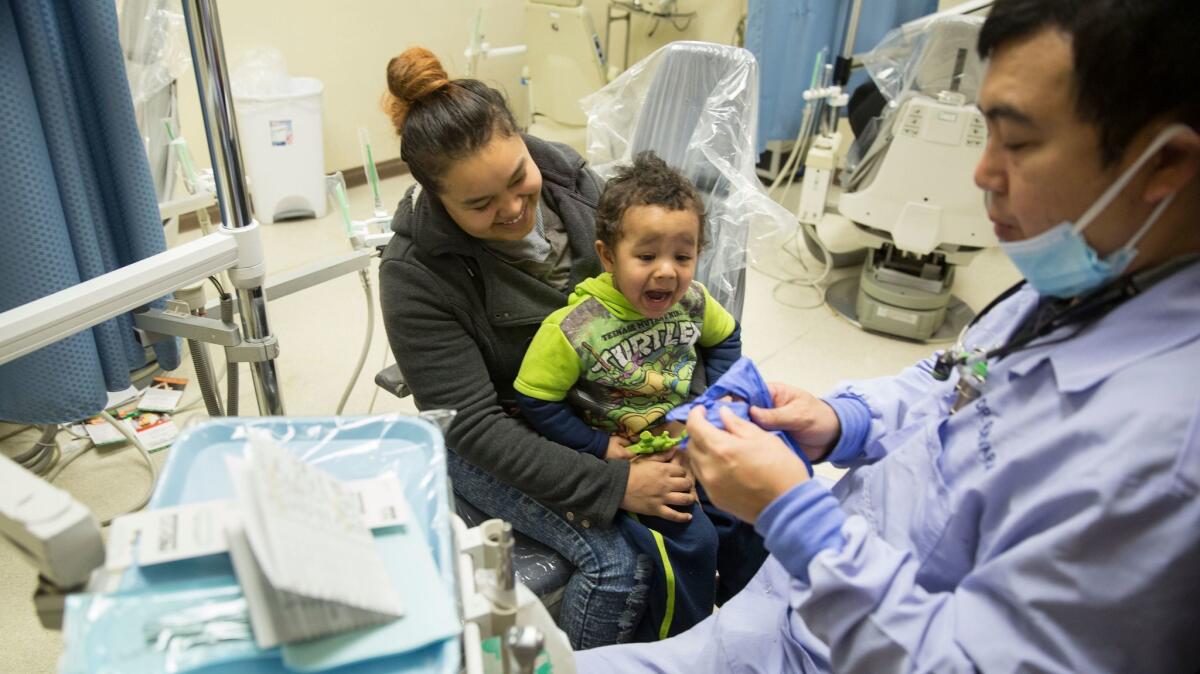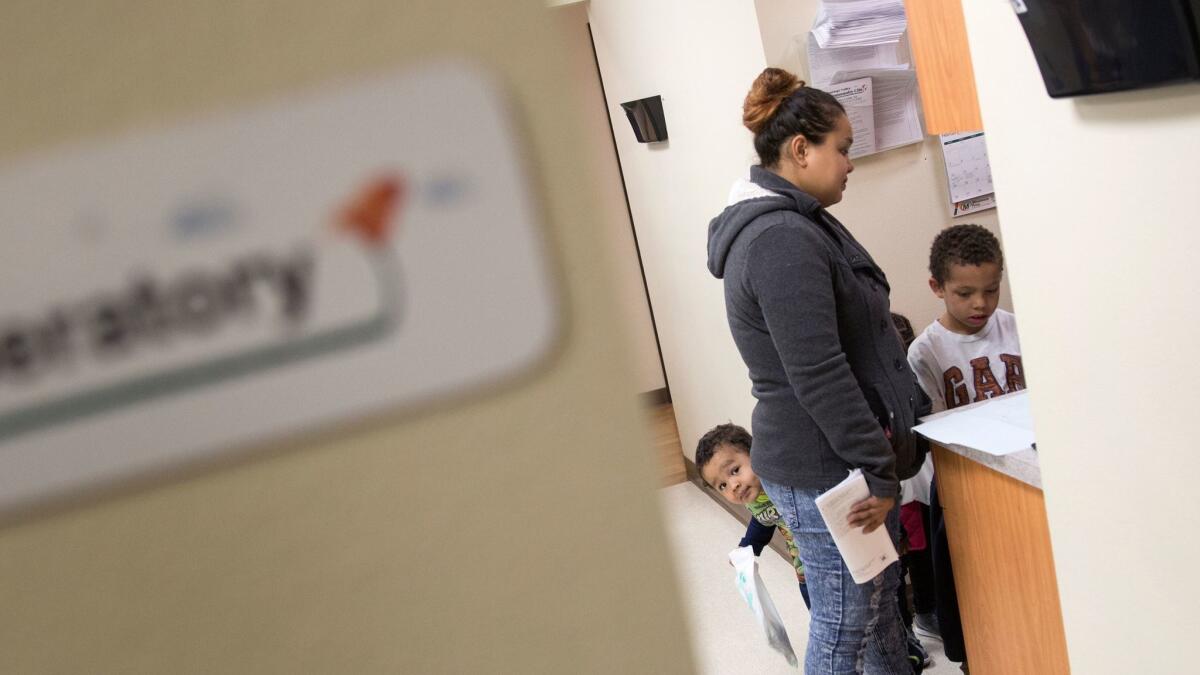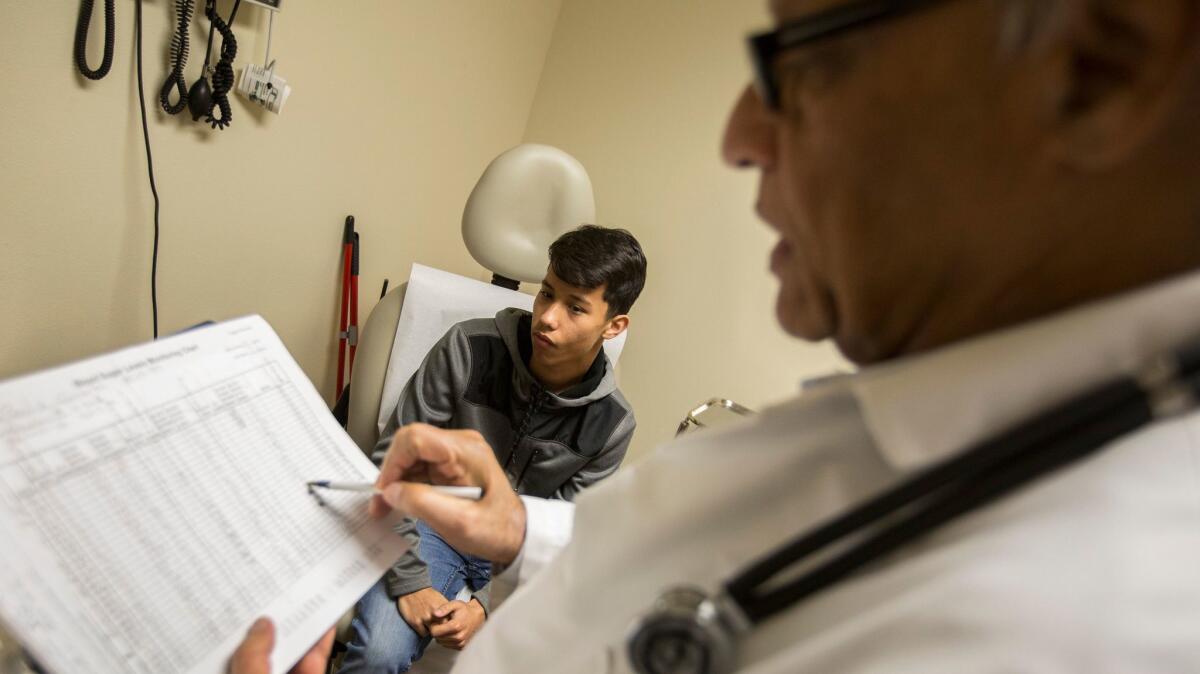The life-and-death stakes of an Affordable Care Act repeal in one of L.A. County’s poorest, sickest regions

- Share via
Nurses and doctors rush through hallways, readying exam rooms. The clinic in Lancaster hasn’t yet opened for the day, but staff members know that once patients start filing in they won’t stop. In less than two hours, it will be standing-room only in the waiting areas.
Eight years ago, the Antelope Valley Community Clinic was a mobile van that offered check-ups and employed fewer than 10 people. Today it’s a health system with two clinics, two vans and 235 employees, and treats 500 patients a day.
“The need was incredible,” said clinic CEO James Cook. The privately owned clinic has repeatedly relocated for more space; later this year Cook is planning to move it into a massive building that was once a supermarket. “I guess I didn’t know how bad it was.”
Now Cook and his staff are anxiously watching how President Trump will act on his promise to repeal the Affordable Care Act. The clinic began expanding before Obamacare, but it was the healthcare law that allowed it to continue growing.
Rolling back of health coverage would likely mean layoffs, fewer services being provided and longer waits for patients, Cook said. It could also halt the progress that’s been made in recent years in improving health in the Antelope Valley, which is home to some of Los Angeles County’s poorest and sickest residents.
“Those are thousands and thousands of patients who would go back to not having any healthcare,” Cook said. “We’ll return to where we were 10 years ago.”
The Affordable Care Act allowed hundreds of community clinics like this one, from South L.A. to San Francisco, to offer medical care to some of the sickest Californians. People who usually delayed seeing a doctor or did so only in emergency rooms could visit a clinic for check-ups and even specialty care.
Millions of Californians became newly insured under Obamacare, and many of them are now threatened with losing that coverage.

Maria Hidalgo showed up at the clinic’s urgent care center — a very busy corner of the Lancaster office — a few years ago when she ran out of insulin. Hidalgo, a diabetic who has insurance through the low-income government health program Medi-Cal, had moved from L.A. and didn’t know where else to go.
The clinic staff assigned Hidalgo to an in-house primary care doctor whom she now regularly sees. On this recent weekday morning, her usual doctor had recommended she meet with the clinic’s endocrinologist who specializes in diabetes care.
Hidalgo, 66, is struggling to keep her diabetes under control, and has started to feel tingling in her feet, a complication after two decades with the disease. But she takes insulin doses as prescribed and is adjusting her diet, she told the physician. “Not as many tortillas as I used to eat,” she said.
Hidalgo is one of thousands of Medi-Cal patients in the region who probably would have gone without medical care if not for clinics like this one. She would have continued visiting urgent care or emergency rooms when she ran out of insulin. Medi-Cal patients often can’t find specialists who take their insurance, so it’s even less likely she would have seen an endocrinologist.

Community clinics, which have traditionally served poor Americans, have been able to offer more services as their patients gained insurance through the Affordable Care Act over the past few years. The Antelope Valley Community Clinic has added dentists, dermatologists, cardiologists, podiatrists and therapists to its staff.
“We’ve literally taken bathrooms and turned them into exam rooms,” Cook said.
Demand has also grown as people gaining insurance for the first time seek medical care. L.A. County’s 350 community clinic sites treated 23% more patients in 2015 than they did in 2010 — serving 1.5 million people each year, according to Louise McCarthy, head of the Community Clinic Assn. of Los Angeles County.
Many clinics that spent years in the red, barely able to keep their doors open, are now finally breaking even because of the Affordable Care Act, which was fully enacted in 2014. But they’re also spending more money to support additional services and patients, she said.
“The ACA has totally transformed so many organizations,” McCarthy said. “These expansions are unsustainable under repeal.”
House Republicans released a bill this month that would preserve parts of the Affordable Care Act, but would scale back Medicaid, the nation’s low-income health program that was expanded under the law.
Medi-Cal, California’s version of Medicaid, ballooned from covering 8.6 million people three years ago to 13.4 million now — more than a third of the entire state.
Half the revenue of L.A. County community clinics comes from Medi-Cal, McCarthy said. At the Antelope Valley clinic, more than 90% of patients have Medi-Cal, Cook said.
Recently, a high school football player with Type 1 diabetes had a question for Dr. Karunyan Arulanantham, the clinic’s medical director and endocrinologist.
Arulanantham had told the 17-year-old he needed to check his blood sugar levels four times a day, when he takes his insulin along with meals.
But “he’s asking me, ‘What do I do when I don’t have food?’ How can he take his insulin regularly when he doesn’t have a regular source of food?” Arulanantham said.
Many of the health problems in the region are multi-generational and part of a vicious cycle of poverty and illness, Cook said. More than 80% of the clinic’s patients are poor. The Antelope Valley has the county’s highest death rates from lung cancer, diabetes and heart disease.

In the past two years, Cook has hired three case managers to help patients deal with troublesome, non-medical issues that can impede healthcare, like transportation to appointments or family problems. A case manager gave the diabetic boy a grocery store gift card to purchase food.
Community clinics nationwide have historically experienced bipartisan support, so some experts think they won’t be harmed by the healthcare changes expected under Trump. Many see them as a model for how to provide cost-effective healthcare to the poor.
But Steven Wallace, UCLA health policy professor, said that any rollback of coverage would negatively affect clinics.
“I don’t think they’re going to go after clinics but I think clinics will still be hurt by it,” he said.
Wallace said there could be a double whammy for clinics: Less money coming in as patients lose insurance, and more newly uninsured patients seeking care.
Last month, about 75 people gathered outside Rep. Steve Knight’s district office in Palmdale, holding signs reading “ACA Saves Lives,” “Fight Knight” and “Healthcare is a right not a privilege.” They wanted to urge Knight, a rare Republican lawmaker in L.A. County, to vote against repealing the Affordable Care Act.
“The healthcare industry here is growing by leaps and bounds, and we’d like it to continue,” said Johnathon Ervin, one of the rally organizers. “We’re going to hold his feet to the fire.”
When Angel Grant took her three kids to the Antelope Valley clinic for physicals on a recent weekday, their pediatrician said two of them needed to see a dentist.
Because dental care typically is sought after medical care, dentists at the clinic treat conditions otherwise only seen in textbooks, said dental director Dr. Richard Rojas. Adults who need all their remaining teeth extracted and replaced with full dentures. Kids with extensive tooth decay. Rare cancers and diseases.
To preserve the next generation’s teeth, new mothers bringing in their babies for their first doctor visits are also now sent to the dental clinic.
“They don’t understand putting Coke in the baby bottle is not a good thing,” he said.
Grant was able to get her kids checked out right away. They were cavity-free and a dentist sent them home with toothbrushes.
“It was actually really convenient,” said Grant, who has Medi-Cal for herself and her kids. “I was just dreading walking out the door thinking I had to make an appointment for them.”
soumya.karlamangla@latimes.com
Twitter: @skarlamangla
Millions of Californians likely would lose coverage under GOP Obamacare replacement, experts say
With Obamacare in jeopardy, California considers going it alone with ‘single-payer’ system
Why therapists are having such a hard time talking about Trump
More to Read
Sign up for Essential California
The most important California stories and recommendations in your inbox every morning.
You may occasionally receive promotional content from the Los Angeles Times.











